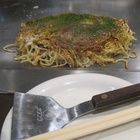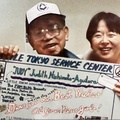“I guess we are throwaway girls,” Risa says, helping me to unpack one of my boxes. I do not know why it is taking her so long. That box has my special okonomiyaki cooking tools—my extra shiny and sharp spatulas, my special knives to slice cabbage extra thin. It will go into the cupboards of her tiny kitchen. Thankfully, Risa does not know how to cook anything, even a bowl of rice.
“What is this?” Risa frowns, holding up a container that is covered in tree bark.
“My secret magic.”
“I can use some magic.” Risa proceeds to twist it open, but I stop her.
“Careful, careful. That is the family secret.”
“Does your uncle know that you have it?”
I ignore her question and refold my T-shirts. I don’t want to even think of my uncle right now.
“Kudaranaimono,” she then sighs, recalling how our families back in Hiroshima think of us.
“I am not hopeless,” I declare. “And Risa, English.” I remind her of our pact. Even though my English is not bad compared to other Japanese, it still is rough. We both vowed to speak English even within the confines of Risa’s studio apartment on 85th Street in Manhattan. It is a silly pact, but I am determined to stick to it. Because I am not a throwaway girl, even though, in essence, I have been thrown away.
I know that if my parents were still alive, this would not have happened. No, I would be the queen of Aka Okonomiyaki, the head chef and proprietor. I picture myself with the bright red scarf around my head and the apron, also red, with the character, “Aka,” on the front in Japanese brush painting.
I usually was in the front position, our huge shiny griddle my canvas, and then the row of customers sitting right there, our audience. There I would spread our special pancake mix into a circle with the back of my ladle and then pile a mound of cabbage on top, along with two slices of the best pork belly. My assistant beside me would be frying up the Chinese noodles. If a customer wanted eggs, I would crack one open with one hand. While placing the cooked egg over the pancake, I’d then deftly flip everything on top of the noodles. Just thinking about it was making my mouth water. It had been two days without a bite of okonomiyaki.
I go into her kitchen area and open a cabinet. It’s filled with thin plywood. The oven, the same. “Risa?!”
“That is my storage area. For my art supplies. The kitchen is actually my studio.”
“But I will need to cook.”
“It is fine that you are living here. I want you here. But you must find another place to cook.”
We go back and forth and Risa then shakes her head. “Kao-chan, let’s stop this English craziness!” she says in Japanese. “It’s bad enough that I have to think in English out there.” She points out the window. “But in my home, with you, let my brain relax. Nihongo is okei.”
I smile. Risa and I have been the closest of friends since first grade. “Sooouu,” I reply back in Japanese. “You’re right. Nihongo is okei.”
* * * * *
Risa is in her twin bed, snoring, while I’m on the floor in a makeshift futon. It is actually packaging from Amazon and when I move, the bubble wrap pops, so I try to keep as still as possible. I feel something at the back of my head. I remember hearing the stories of rats in New York City, alligators coming out of toilets.
I stifle a scream and turn. “Tamago!”
Risa’s yellow tabby has been in hiding these past two days that I have been there.
I carefully prop myself up—pop, pop—and take the cat in my arms. “Don’t you remember me? I’m your auntie!” I fiercely whisper in her ear.
She finally purrs in recognition. I sink back in the bubble wrap, but I know that sleep will not come easily. I am jetlagged, for sure, but I know that my insomnia is more about my worries.
I was able to come here on a B-2 visa to open up a business, which was a miracle in itself. I only have 3,000,000 yen, about $30,000, to open up an okonomiyaki shop in New York City. I know that it’s a ridiculously low sum. I cannot afford a food truck, and probably not even a pushcart. And who knows if anyone will want to eat the savory pancake of my beloved hometown?
I look over to Risa, who looks beautiful even though her mouth is half-open and she’s drooling a little. We have been at each other’s side for so long, but no one has mistaken us for sisters. Her shiny long hair is jet black, while my short brown hair is frizzy as if I had received a shock from an electrical outlet. She stands about 1.75 meters while I am sadly only at 1.5.
Risa would not have been a “throwaway girl”—her term—if it had not been for her new stepmother. In Japan, we have our own Cinderella story, Chujo-hime, and Risa is that story’s poor heroine—well, at least in some ways. In Chujo-hime, the disparaged stepdaughter becomes a nun to escape her plight, but I cannot see Risa running away to join a temple. This apartment and her college tuition are being paid for by a British benefactor she met while touring with a Hiroshima troupe in a production about Sadako, the young Japanese girl who died from the effects of the atomic bomb. The man was taken with her set design and insisted that she further her education. The best place? New York City, of course, and he will pay for everything. I do not ask about the details of their arrangement, mostly because I do not want to know.
We are now reunited, but I do not know if either of us will have a happy ending. Tamago finally settles down on my stomach and begins to sleep. Soon, I do, too.
* * * * *
In the morning, I feel better. The autumn sun is peeking through Risa’s curtains. It is a good day, I declare. One step forward in solving my problems.
Risa has already showered and dressed, looking as cute and bohemian as a theatre arts graduate student can look. She is wearing a pleated skirt with leg warmers and a striped cardigan; a flowered scarf is tied around her neck.
The water pressure is pretty awful in her shower, but at least the water is hot. I’ve just scrubbed myself with soap when I hear Risa at the unlocked door. “Kao-chan, Kaori.”
“What?” I ask, my eyes closed to avoid the soap suds.
“You have a phone call.” She says it with dread.
“What? My cell? Must be a wrong number.” I have not had time to change over to a US phone carrier.
“No, he’s calling on mine. It’s your uncle. He wants to talk to you.”
© 2016 Naomi Hirahara





